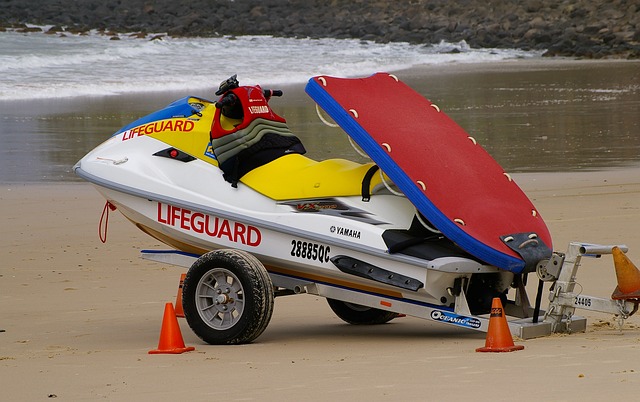Eco-friendly boat batteries represent a significant advancement in maritime energy storage, offering sustainable alternatives to conventional lead-acid batteries with fewer environmental risks and hazardous materials. These green power sources are designed with sustainability in mind, featuring nickel-metal hydride (NiMH), lithium-ion, and Absorbed Glass Mat (AGM) technologies that boast longer service lives, greater energy efficiency, and lower ecological footprints. The adoption of these batteries supports broader sustainability objectives by reducing toxic releases, enabling safer disposal and recycling, and conserving resources throughout their lifecycle. Investing in eco-friendly boat batteries not only aligns with global environmental goals but also presents a cost-effective solution over time due to their durability and efficiency. Proper maintenance is key for maximizing their performance, and selecting the right technology, like lithium-ion or AGM, ensures that mariners can enjoy cleaner, more reliable energy without compromising on boat performance. As part of a comprehensive approach to sustainability, responsible disposal and recycling of these batteries are crucial to maintain their environmental benefits and advance towards a greener future for the maritime industry.
Embarking on a journey towards sustainability, the shift to eco-friendly batteries, particularly in marine applications, is not just an environmental imperative but a practical advancement. This article delves into the transformative role of sustainable battery technologies, highlighting their positive impact on the environment and their superior longevity and performance when compared to traditional boat batteries. We will explore the integration of these batteries with renewable energy sources, the green material composition that minimizes ecological footprints, and the cost-effective benefits they offer over time. Additionally, we address the critical aspects of disposal and recycling to ensure a sustainable future for our waterways. By understanding how to select and maintain eco-friendly boat batteries, enthusiasts and professionals alike can harness the full potential of these innovations for optimal performance and longevity.
- Understanding Eco-Friendly Batteries and Their Impact on the Environment
- The Longevity and Performance Advantages of Boat Batteries Over Traditional Options
- The Role of Renewable Energy Integration with Eco-Friendly Batteries
- Environmental Benefits of Sustainable Battery Technologies in Marine Applications
- Material Composition and the Green Footprint of Modern Boat Batteries
- Cost Analysis: Long-Term Savings with Eco-Friendly Battery Systems
- The Importance of Proper Disposal and Recycling of Old Batteries for a Greener Future
- How to Select and Maintain Your Eco-Friendly Boat Battery for Optimal Performance and Longevity
Understanding Eco-Friendly Batteries and Their Impact on the Environment

Eco-friendly batteries represent a significant advancement in energy storage technology, offering a sustainable alternative to traditional lead-acid and other harmful battery types. These batteries, which can include nickel-metal hydride (NiMH), lithium-ion (Li-ion), and newer technologies like flow batteries, are designed with minimal environmental impact in mind. They are engineered to avoid the use of hazardous materials found in conventional batteries, reducing the risk of toxic leakage and the environmental footprint associated with their disposal or recycling. For instance, a boat battery, a critical component for maritime navigation and onboard systems, can be an eco-friendly option that powers vessels without the ecological drawbacks of older lead-acid batteries. The shift to eco-friendly batteries not only mitigates the release of harmful substances into the environment but also aligns with the broader objectives of sustainability and conservation, particularly in sensitive ecosystems like aquatic environments. As renewable energy sources become more integrated into both land and marine applications, the demand for these green power solutions grows, signaling a shift towards cleaner and more responsible energy use practices. The adoption of eco-friendly batteries is instrumental in reducing greenhouse gas emissions and fostering a healthier planet, making them an indispensable choice for individuals and industries committed to sustainability.
The Longevity and Performance Advantages of Boat Batteries Over Traditional Options

When it comes to powering boats, eco-friendly batteries present a significant upgrade over traditional options in terms of both longevity and performance. These advanced boat batteries, often composed of sustainable materials like lithium iron phosphate or lead-acid with enhanced additives, offer longer service lives, meaning fewer replacements and lower environmental impact over time. Unlike their conventional counterparts, eco-friendly boat batteries maintain a consistent output throughout their charge cycles, ensuring that your marine electronics operate reliably from start to finish. Their high energy density allows for more power storage in a smaller size, which is crucial for optimizing space on board. Moreover, the reduced self-discharge rate of these batteries means they retain charge better, even when not in use, which is particularly advantageous for seasonal boaters. This translates to less waste and lower costs associated with regularly recharging or replacing batteries. In addition to their longevity, eco-friendly boat batteries are designed to handle the harsh marine environment, offering superior resistance to corrosion and vibration, factors that can significantly reduce the lifespan of traditional batteries. As a result, choosing eco-friendly boat batteries is not only a sustainable choice but also a practical one for those looking to enhance their vessel’s power systems with durability and efficiency in mind.
The Role of Renewable Energy Integration with Eco-Friendly Batteries

Renewable energy sources, such as solar and wind power, have become increasingly integral to sustainable energy grids. The integration of these sources, however, poses unique challenges due to their intermittent nature. This is where eco-friendly batteries play a pivotal role. These batteries, including those specifically designed for marine applications like boat batteries, serve as vital storage solutions that can capture excess energy generated during peak production times and release it when needed, thus ensuring a consistent power supply. The ability to store energy not only mitigates the limitations of renewable energy but also enhances its reliability, making it a more practical alternative to fossil fuels.
Moreover, the adoption of eco-friendly batteries is essential for optimizing the performance of renewable energy systems. Advanced battery technologies are capable of handling high current loads and can operate over a wide range of temperatures, which is particularly important in marine environments where conditions can be harsh. By storing energy from renewable sources, these batteries enable smoother transitions between energy generation and consumption, thereby facilitating a more seamless and sustainable energy future. The role of boat batteries in this context is significant, as they demonstrate the practical application of such technologies in real-world scenarios, pushing the boundaries of sustainability in transportation and beyond.
Environmental Benefits of Sustainable Battery Technologies in Marine Applications

Eco-friendly batteries play a pivotal role in advancing sustainability, particularly within marine applications where traditional lead-acid batteries have long been the norm. The transition to sustainable battery technologies, such as lithium-ion and other advanced chemistries, offers significant environmental benefits over their conventional counterparts. For instance, boat batteries that employ green technology significantly reduce the release of harmful substances into aquatic ecosystems. These eco-conscious batteries minimize acid leakage risks associated with lead-acid options, thereby preserving the integrity of marine habitats and protecting biodiversity.
Moreover, the lifecycle of sustainable boat batteries is typically longer than that of traditional batteries, reducing waste and the frequency of replacements. The manufacturing process of these batteries also tends to be less resource-intensive, involving materials that are more abundant and have a lower environmental impact. As a result, adopting eco-friendly battery technologies in marine applications not only aligns with global sustainability goals but also contributes to the long-term health of our oceans and waterways. This shift underscores a commitment to cleaner energy solutions that are essential for the conservation of marine life and the mitigation of environmental degradation.
Material Composition and the Green Footprint of Modern Boat Batteries

In the realm of maritime technology, the transition to eco-friendly batteries is paramount for sustainable practices. Modern boat batteries, particularly those designed with sustainability in mind, are crafted from materials that minimize environmental impact. These advanced batteries often utilize lead-free compositions, which reduce soil and water pollution associated with traditional lead-acid batteries. The materials selected for these batteries not only ensure longer life spans but also guarantee safer disposal at the end of their service life. This shift towards greener battery technologies is a significant step in mitigating the carbon footprint of boating activities.
Furthermore, the manufacturing process of eco-friendly boat batteries takes into account the entire lifecycle of the product, from resource extraction to production, use, and recycling. The aim is to optimize energy efficiency and minimize waste. By employing renewable energy sources during manufacturing and integrating recyclable or biodegradable components, these batteries significantly lower their green footprint. This holistic approach not only contributes to the health of aquatic ecosystems but also aligns with global sustainability goals, emphasizing the importance of responsible consumption and eco-innovation in all sectors, including maritime transportation.
Cost Analysis: Long-Term Savings with Eco-Friendly Battery Systems

Investing in eco-friendly batteries, such as those used in a boat battery system, presents a compelling case for long-term savings that align with sustainability goals. The initial cost of eco-friendly batteries might be higher than their traditional counterparts, but this upfront investment is often offset by the longevity and efficiency these systems offer. Eco-friendly batteries are designed to have a greater number of charge cycles before performance degrades significantly, which means they can be used more extensively over time without needing replacement as frequently. This reduced frequency of replacements translates to significant savings in the long run for users, particularly in applications like marine environments where reliability and durability are paramount. Moreover, the environmental impact of these batteries is minimized throughout their lifecycle, from production to disposal, thanks to the use of non-toxic materials and recyclable components. This not only contributes to a smaller carbon footprint but also to the preservation of aquatic ecosystems, making eco-friendly boat batteries an environmentally conscious choice that also makes economic sense over their service life.
The Importance of Proper Disposal and Recycling of Old Batteries for a Greener Future

Opting for eco-friendly batteries, such as those used in boats, is a pivotal step toward sustainability. However, the journey doesn’t conclude with their initial purchase; the responsible disposal and recycling of these batteries are equally crucial. Traditional lead-acid boat batteries pose significant environmental risks when discarded improperly, leaching harmful substances like lead into soil and water sources. Conversely, eco-friendly batteries, often composed of materials like lithium or nickel, present a safer alternative due to their reduced toxicity. When these greener options reach the end of their lifecycle, they must be recycled to prevent environmental contamination. Recycling not only conserves natural resources but also mitigates the ecological footprint associated with battery production and disposal. It’s imperative for manufacturers, consumers, and waste management entities to collaborate effectively to ensure a streamlined process for collecting and processing these batteries. By prioritizing recycling initiatives, we can significantly diminish the environmental impact of boat batteries and pave the way toward a more sustainable future.
How to Select and Maintain Your Eco-Friendly Boat Battery for Optimal Performance and Longevity

When selecting an eco-friendly boat battery, it’s crucial to consider the type of battery technology that offers both environmental sustainability and optimal performance. Among the most sustainable options are lithium-ion and AGM (Absorbed Glass Mat) batteries. Lithium-ion batteries boast high energy density, long life cycles, and minimal environmental impact during their usage phase. They’re also lighter than traditional lead-acid batteries, which can be a significant advantage for boats. On the other hand, AGM batteries are spill-proof and have a reputation for durability and reliability, with a lower environmental impact compared to other lead-based options. Once you’ve chosen the right eco-friendly battery for your boat, proper maintenance is key to ensuring its longevity and continued performance. Regularly check the water levels in flooded lead-acid batteries if you opt for this type, as topping off the electrolyte solution is essential for their function. For maintenance-free options like lithium-ion or AGM batteries, monitor the charge levels and avoid overcharging, which can reduce the battery’s lifespan. Additionally, store your boat in a cool, dry place to prevent extreme temperatures from affecting the battery’s performance. Regular charging routines that involve partial discharge followed by full recharge cycles will help maintain the battery’s health. Employing smart charge controllers can automate this process, ensuring your eco-friendly boat battery operates at peak efficiency throughout its lifespan.
In concluding our exploration of the topic, it’s evident that eco-friendly boat batteries stand as a beacon of innovation in the pursuit of sustainability. Their positive environmental impact, superior longevity, and performance, particularly when paired with renewable energy sources, make them an indispensable choice for modern maritime endeavors. The material composition of these advanced batteries also contributes to a significantly reduced green footprint compared to traditional options. Financially, the long-term savings associated with eco-friendly battery systems are a compelling incentive for boat owners and operators alike. Moreover, responsible disposal and recycling practices are paramount in ensuring that the transition to sustainable energy solutions benefits not just individuals but also our planet. As we navigate towards a more sustainable future, the selection and maintenance of eco-friendly boat batteries are critical steps in optimizing their performance and lifespan, thereby reinforcing the commitment to environmental stewardship. It is clear that embracing these technologies is not only a responsible choice but also a necessary one for the preservation of our oceans and ecosystems.
